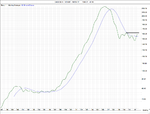new_trader
Legendary member
- Messages
- 6,770
- Likes
- 1,656
John Murphy, author of the book that many regard as the bible on TA, Technical Analysis of the Financial Markets defines it as:
“The study of market action, primarily through the use of charts, for the purpose of forecasting future price trends”.
Using the above definition: Would you/Do you use T.A to determine when you should buy and sell property? I am referring to buying/selling a physical investment in property or a home you plan to occupy, but does not include property financial instruments like shares.
“The study of market action, primarily through the use of charts, for the purpose of forecasting future price trends”.
Using the above definition: Would you/Do you use T.A to determine when you should buy and sell property? I am referring to buying/selling a physical investment in property or a home you plan to occupy, but does not include property financial instruments like shares.



